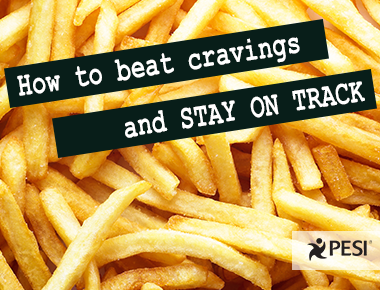Teflon for Cravings

Cravings and urges are like powerful gusts of wind that can appear quickly and powerfully. If you're not ready, these gusts can spin you out of control and sap your ability to stay on course, not to mention diminish your clarity and resilience. To better manage unexpected (or familiar) cravings, do this:
Sign up for a FREE CE video: One Minute Mindfulness featuring Donald Altman, M.A., LPC.
This blog is based on the writing of Donald Altman, M.A., LPC. You can read more in Donald's book, 101 Mindful Ways to Build Resilience.
Donald Altman is a psychotherapist, award-winning writer, former Buddhist monk, teacher and adjunct faculty at Portland State University. He is also a faculty member of the Interpersonal Neurobiology program at Portland State University and teaches various classes blending mindfulness and Interpersonal Neurobiology.
— How —
- Get curious about the craving instead of fighting it or giving into it. You can inquire:
- How intense is this craving?
- How frequent is this craving?
- Where is the craving located—is it in the body or is it in the mind?
- Was there a feeling that preceded this craving—such as loneliness, sadness, abandonment, or boredom, etc.? Give this feeling a name.
- Does the craving really address the underlying feeling? Or, is it just a temporary escape or distraction from an uncomfortable feeling?
- Notice and rate the intensity of the craving on a 1-5 scale, with 5 the greatest intensity.
- Observe and monitor the craving for 1-3 minutes. Notice how the craving is temporary and not permanent, and how its intensity changes over time.
- Notice how observing and accepting a craving or urge lets you detach from it, even slightly.
- Not that you have disengaged, consider an alternative choice, behavior, or distraction that turns you away from the craving and toward a more beneficial direction.
— When —
Become Teflon for cravings whenever you find clarity is being lost due to a craving. This approach lets you outlast the craving, learn more about yourself, and be less vulnerable to unhealthy cravings over time.Sign up for a FREE CE video: One Minute Mindfulness featuring Donald Altman, M.A., LPC.
 |
This blog is based on the writing of Donald Altman, M.A., LPC. You can read more in Donald's book, 101 Mindful Ways to Build Resilience.
Donald Altman is a psychotherapist, award-winning writer, former Buddhist monk, teacher and adjunct faculty at Portland State University. He is also a faculty member of the Interpersonal Neurobiology program at Portland State University and teaches various classes blending mindfulness and Interpersonal Neurobiology.
Topic: Mindfulness




